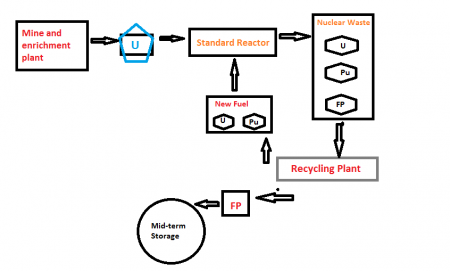India adopted Closed Fuel Cycle- Reprocessing of Nuclear fuel 28/06/2019 – Posted in: Press Information Bureau – Tags: Nuclear recycling
India adopted ‘Closed Fuel Cycle’- Reprocessing of Nuclear fuel
(Department of Atomic Wastes)
WHAT
India has adopted “closed fuel cycle”, where spent nuclear fuel is regarded as a material of resource.
The nuclear waste management practices are at par with international practices following the guidelines of the International Atomic Energy Agency (IAEA).
AIM
The closed fuel cycle aims at reprocessing spent fuel for recovery of uranium and plutonium and recycling them back to the reactor as fuel.
SIGNIFICANCE
- Reprocessing of spent fuel leads to a very small percentage of residual material present in spent nuclear fuel requiring their management as radioactive waste.
- The high-level radioactive waste also contained many useful isotopes like ‘Caesium-137’, ‘Strontium-90’, ‘Ruthenium-106’ etc.
- A closed fuel cycle can help India reduce its high-level waste while meeting its goal of a sustainable nuclear programme.
RADIOACTIVE WASTE
- It is the waste that contains radioactive material. Radioactive waste is hazardous to most forms of life and the environment.
- Radioactive wastes are generated during various operations of the nuclear fuel cycle. Mining, nuclear power generation, and various processes in industry, defense, medicine and scientific research produce byproducts that include radioactive wastes.
- Radioactive waste can be in gas, liquid or solid form, and its level of radioactivity can vary.
- The waste can remain radioactive for a few hours or several months or even hundreds of thousands of years.
RADIOACTIVE WASTE MANAGEMENT
- Not all nuclear wastes are particularly hazardous or hard to manage as compared to other toxic industrial wastes.
- It is also a time of heightened global concern about nuclear energy after the earthquake and the fear of the radioactive releases from the affected damaged reactors in Japan.
- In accordance with international guidelines, a coherent comprehensive and consistent set of principles and standards are being practiced all over the world for the waste management system.
- Nuclear power is the only large-scale energy-producing technology that takes full responsibility for all its waste and fully costs this into the product.
- The amount of waste generated by nuclear power is very small relative to other thermal electricity generation technologies.
CLOSED FUEL CYCLE
In closed fuel cycles, the remaining uranium in spent fuel, along with different isotopes of plutonium will be removed so that it can be reused as fresh fuel.
The adoption of a closed fuel cycle is necessary for the efficient use of uranium resources, reduction of high-level waste (HLW) and large scale utilisation of its thorium reserves.
With closed cycle approach, the Department of Atomic Energy expects to greatly reduce the volume of HLW meant for final disposal, by transmuting minor actinides into fission products and long-lived fission products into nuclides with short half-lives.
Source: PIB
You can follow us on LinkedIn and on Instagram (Diligent IAS) for more updates related to IAS Preparation/ Study Material, Subscribe to our Facebook Page and Youtube Channel- Diligent IAS
Also, read more PIB Updates
- Beekeeping Development Committee report 2019
- Shyama Prasad Mukherji Rurban Mission
- Indian Air Force Exercise Garuda-VI
- Surjit Bhalla Committee on Trade and Policy

